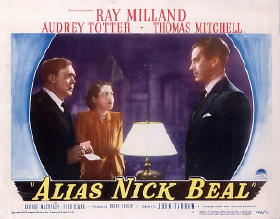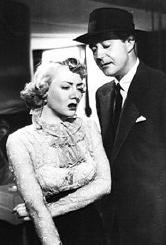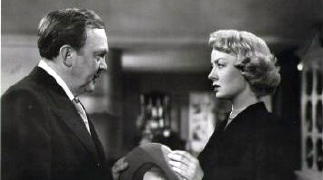Sun 15 Jun 2008
ALIAS NICK BEAL. Paramount, 1949. Ray Milland, Thomas Mitchell, Audrey Totter. Screenwriter: Jonathan Latimer, based on a story by Mindret Lord. Director: John Farrow.

First of all, you may as well go watch this short clip from the movie at YouTube right now, as long as you come back. It’s the first time the viewer gets to see Nick Beal on the screen, played to superb perfection by the ultra-urbane (and more than slightly creepy, in a subtle but obvious, just-under-your-skin sort of way) by Ray Milland, an actor who throughout his career could apparently play both hero and villain with equal ease.
Meeting him at this rundown waterfront bar is Joseph Foster (Thomas Mitchell), an ambitious but reform-minded District Attorney who doesn’t know it yet, but who has eyes on the governor’s office. Mitchell played rumpled and generally honest guys like this by hardly getting out of bed.
I’m going to tell you something now that I didn’t know when I started to watch the movie (or was able to conveniently forget), so if you don’t want to know, stop reading now. For some reason this movie is not readily available on video or DVD, but every write-up about it — and there are quite a few of them — talks about it freely, so I think that maybe I won’t be revealing anything too crucial by continuing.

Still with me? As the story goes, or at least this one does, if Nick Beal is not the Devil, he has strong connections to him.
If this first scene doesn’t come out and say so, each time he’s on the screen again, he simply knows too much or can do too much and pretty soon he’s got Foster in the palm of his hand, urging him on as only the Devil could do: “Think of all the good you could do if you were the governor,” he says, the unspoken context and agreement being: no matter how you get there or who you have to consort with to do so.
Is this noir? If you’ve seen the film clip, how could you say no? Is this a crime film? No, not unless a few cheap gangsters, blackmail (on the part of Nick Beal), graft and corruption on a strictly state and city level makes a movie a crime film, and then, of course, it is.
What this is movie really is a fantasy film, not a soft fluffy one, but one with some sharp corners and awfully hard edges. And with the atmosphere of seduction and crime always in the background — did I mention Audrey Totter yet? If I haven’t, I will. And with, as I began to say, seduction and crime the absolute focal point of this morality tale of ambition and greed, the movie is as noirishly dark as anyone could wish for.

Until the ending that is, and if noir means unhappy endings, than this isn’t noir. Unless noir means learning about the darkness that exists in everyone’s heart, and even when he’s bested once or twice, a third time out of three is good enough for the likes of Mr. Beal.
Audrey Totter plays Donna Allen, a woman who has traversed far too many bars in her young lifetime — presumably as well a lady of ill-repute — but here I am going into things the movie dares not quite come out and say. But recruited by Mr. Beal with promises to her of the finer things in life, she goes to work for Mr. Foster, and upon Beal’s request, soon has him in the palm of her hand, ready to leave his wife and do things with her that 48-year-old men have no right thinking about doing with anyone other than their wives.

None of which we see, and which probably didn’t happen, but might have, and about we can easily surmise what Thomas Mitchell’s character would have like to have happened if it didn’t.
In this film, though, we see another side of Audrey Totter, the actress. Quite often in the films she’s in — see Tension, in which she plays the two-timing wife of druggist Richard Basehart as a prime example — her characters are always tough and totally in contempt of the men whose emotions she plays with.
In Alias Mr. Beal, we also see that she can play a character of a less hard-boiled nature, and she’s a marvel to watch as she gradually begins to realize, to her dismay, just whom she has fallen in league with.
A lot of the attraction for many films that are hard to find copies of is that, well simply, that they’re hard to find. Their reputation is enhanced, in other words, by their unavailability. That’s somewhat the case here. I’d heard many good things about this movie, without knowing most of the details, that when I finally got to see the film, its immediate impact was less than I’d anticipated.
No matter. A score card rating of 80% isn’t at all bad, at least in my book, especially since it’s an 80% based on already enhanced expectations.
[UPDATE] 06-17-08. Not being very happy that I hadn’t provided a better photo of Thomas Mitchell, I went looking for one, and here’s what I came up with. Rather nice, in my opinion:

January 22nd, 2009 at 11:02 pm
Alias Nick Beal is one of a number of teamings between director John Farrow and screenwriter Jonathan Latimer that include the classic The Big Clock and Night Has 1000 Eyes. Latimer also wrote the screenplay for Back to Eternity, the remake of Farrow’s classic B-film Five Came Back. His best known film contribution was the screenplay for The Glass Key with Alan Ladd, Veronica Lake, and Brian Donlevy. He also wrote many episodes of Perry Mason. Ironically he didn’t script any of the films based on his own novels (Lady In the Morgue, The Westland Case, Bermuda Mystery). His first screenplay, The Lone Wolf’s Spy Hunt, is considered a model of a B series programer and benefited from a cast that included Ida Lupino and Rita Hayworth.
Also notable in Alias Nick Beal is an early role for George Macready who plays an older priest even though he is younger than Mitchell or Milland. Watch for the scene where he notes the resembalence between Milland and a Rembrandt painting of Satan. A very good film that has never gotten it’s full recognition though I would rank it very close to the critically acclaimed Nightmare Alley. Likely the fantasy elements of the film and the film noir mood confused audiences and critics, even with a “happy” ending the film has a feel of darkness and resignation that most fantasy films don’t.
February 28th, 2009 at 11:57 am
[…] Latimer and director John Farrow teamed up at least once before in Alias Nick Beale, reviewed here by me some time ago. […]
November 7th, 2014 at 6:17 pm
This could best be described as fantasy/noir, a sub-genre that includes only one other film I can think of: REPEAT PERFORMANCE (1949.) It’s also the only film in the known Universe where GeorgeMacready is more sympahetic than Ray Milland.
And if you want to see something really creepy, check out the IMDB profile of the co-author of the screenplay, Mindret Lord
http://www.imdb.com/name/nm0520478/bio?ref_=nm_ov_bio_sm